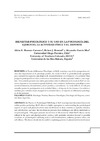Identificador persistente para citar o vincular este elemento:
https://accedacris.ulpgc.es/jspui/handle/10553/7787
| Campo DC | Valor | idioma |
|---|---|---|
| dc.contributor.author | Romero Carrasco, Alicia E. | en_US |
| dc.contributor.author | Brustad, Robert J. | en_US |
| dc.contributor.author | García-Mas, Alexandre | en_US |
| dc.date.accessioned | 2012-08-09T11:25:00Z | |
| dc.date.accessioned | 2018-03-14T08:02:43Z | - |
| dc.date.available | 2012-08-09T11:25:00Z | |
| dc.date.available | 2018-03-14T08:02:43Z | - |
| dc.date.issued | 2007 | en_US |
| dc.identifier.issn | 1886-8576 | en_US |
| dc.identifier.uri | https://accedacris.ulpgc.es/handle/10553/7787 | - |
| dc.description.abstract | La Teoría del bienestar Psicológico de Ryff, constituye uno de las perspectivas teóricas más importantes en la psicología positiva. La teoría de Ryff es particularmente apropiada para entender los aspectos psicológicos de desenvolvimiento en el deporte y la actividad fisica porque la participación en estos contextos es normalmente de alta capacidad volitiva y auto regulada. Este articulo presente una visión panorámica sobre la utilización de la teoría de Ryff en contextos deportivos con atención especial dedicada a los correlatos del bienestar psicológico como autodeterminación, afrontamiento, afecto positivo, y autoeficacia. La teoría debe de ser útil para entender pautas de participación en la actividad fisica y el deporte de los jóvenes y los adultos y también para entender mejor el papel de la actividad física y el deporte en el bienestar psicológico de las personas. | en_US |
| dc.description.abstract | The Theory of Psychological Well-Being of Ryff is an important theoretical framework within positive psychology. Ryff ’s theory is highly appropriate to understanding the psychological aspects of sport and physical activity since involvement in these activities is typically voluntary and self-directed, and since this involvement presents clear challenges and allows individuals to set personal goals. This paper presents an overview of the means by which Ryff’s theory can be utilized in the sport and physical activity context, with particular attention devoted to possible correlates of psychological well-being such as self-determination, resiliency, positive affect, and self-efficacy. The theory should also be useful to explaining patterns of physical activity involvement in youth and adults and in better understanding the role of sport and physical activity in individuals’ psychological well-being. | en_US |
| dc.format | application/pdf | es |
| dc.language | spa | en_US |
| dc.relation.ispartof | Revista Iberoamericana de Psicologia del Ejercicio y el Deporte | en_US |
| dc.source | Revista Iberoamericana de Psicología del Ejercicio y el Deporte. Sevilla : Wanceulen, 2006- .-- ISSN 1886-8576. año 2007, vol.2, n.2 | en_US |
| dc.subject | 61 Psicología | en_US |
| dc.subject.other | Psicología Positiva | en_US |
| dc.subject.other | Bienestar Psicológico | en_US |
| dc.subject.other | Psicología del Deporte | en_US |
| dc.subject.other | Actividad físico-deportiva | en_US |
| dc.title | Bienestar psicológico y su uso en la psicología del ejercicio, la actividad física y el deporte | en_US |
| dc.type | info:eu-repo/semantics/article | en_US |
| dc.type | Article | en_US |
| dc.compliance.driver | 1 | es |
| dc.identifier.absysnet | 537108 | - |
| dc.identifier.crisid | -;-;- | |
| dc.investigacion | Artes y Humanidades | en_US |
| dc.rights.accessrights | info:eu-repo/semantics/openAccess | es |
| dc.rights.accessrights | info:eu-repo/semantics/openAccess | es |
| dc.type2 | Artículo | en_US |
| dc.identifier.external | -;-;- | - |
| dc.identifier.ulpgc | Sí | es |
| dc.description.sellofecyt | Sello FECYT | |
| dc.description.esci | ESCI | |
| dc.description.erihplus | ERIH PLUS | |
| item.grantfulltext | open | - |
| item.fulltext | Con texto completo | - |
| Colección: | Rev. Iberoam. psicol. ejerc. deporte. 2007. v.2, n.2 Artículos | |
Visitas
292
actualizado el 16-ene-2026
Descargas
1.139
actualizado el 16-ene-2026
Google ScholarTM
Verifica
Comparte
Exporta metadatos
Los elementos en ULPGC accedaCRIS están protegidos por derechos de autor con todos los derechos reservados, a menos que se indique lo contrario.
